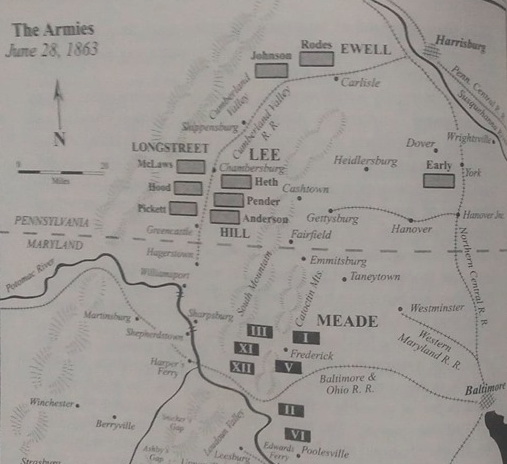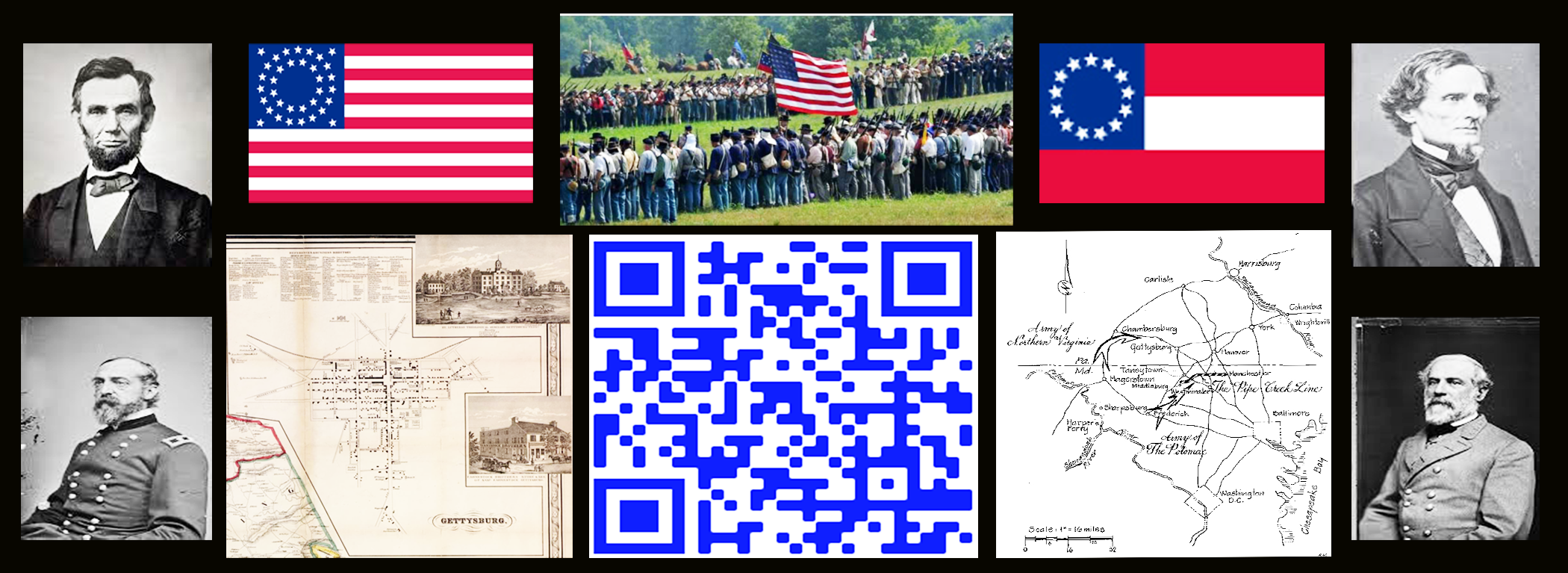A Different Turn?
Having pretty much decided that Lee’s invasion was doomed from the start – unless he could somehow have captured Westminster – I keep looking at ways he could have altered the course of history. I postulate that he gave Hooker too much time to respond and shift forces to counter his move.
We know that Ewell was near Carlisle on 29 June, but he hadn’t been there long. Backtracking in time, puts him near Cashtown on the 28th, and Chambersburg on the 27th. My understanding is that that there is a pass through the South Mountain near Emmittsburg. If Ewell had turned east through that pass he could likely have been at Emmittsburg on the 27th.

It’s a bit harder to fix the Union forces in those days, but it seems that Reynolds didn’t arrive at Emmittsburg until 29 June and then he dispatched Buford north on the 30th. It is quite likely that he was closer to Fredrick MD on the 27th.
Hooker was seemingly approaching Pipe Creek and probably the Fifth and Sixth Union Corps were nearby. The other 4 Union Corps had likely not yet moved north of Westminster. Reynolds’ First Corps and Howard’s Eleventh were en route to Emmittsburg.
It is not entirely clear whether an early approach to Emmittsburg would have yielded a clear advantage to Lee, but the extra days that it took for Hill’s Corps to follow Ewell and round the north end of South Mt. towards Chambersburg certainly gave Hooker time move his forces north. WHATIF Lee had crossed through the mountain pass and approached Emmittsburg?
Lee was firmly against his troops looting, but he most assuredly allowed them to ‘procure’ food and whatever other military-related supplies Emmittsburg had to offer. Since they were still unsure as to where the Union troops might be, Ewell would have had to defend Emmittsburg to allow Hill to bring his corps through the pass. He might have been tempted to send Early on towards Taneytown. But a single division operating alone behind enemy lines with the whereabouts of those troops uncertain would have been a dangerous chess move.
[See Section 30f and the speculation of not occupying Gettysburg after Early passed though]
We know Heth’s division was about a day’s march behind Ewell. So he would have arrived on or about the morning of the 28th. Again, before Reynolds’ First Union Corps had moved close to the city. Hood of Longstreet’s Corps was another day behind Hill’s Corps. So he’d be moving through that mountain pass on the 29th. To make room at Emmittsburg, Lee would likely send Hill’s Corps on a movement to contact towards Taneytown. Ewell would stay in place guarding the southern approach to Emmittsburg.
Reynolds would then have encountered Ewell’s blocking force as he moved up from Fredrick to Emmittsburg. It is thought that he took the westerly approach and did not move past Taneytown. Precisely where the Union Eleventh Corps was at this time is uncertain but it was close behind Reynolds. To avoid congestion, it is quite likely that it was possibly moving from Westminster to Emmittsburg via Taneytown. That means that Hill would encounter him as each marched towards that city.
The 29th of June would then would mark the anniversary of the Battle of Emmittsburg as clashes would take place to its south and east. Since Hill and Howard’s Corps were on the move, their engagement would have somewhat fleeting, with each quickly disengaging since neither would know how much support the other had to its rear. Ewell would have been firmly entrenched south of Emmittsburg when Reynolds bungled into him.
The variables to determine the winners become quite numerous at this point. How fast could Hooker/Meade bring up more troops? Which way would Lee send Longstreet to support? Would Lee simply dig in around Emmittsburg and wait for the Union troops to make their move?
Whatever the answer to those questions, it would seem that this early right turn would not have gained Lee much. He’d now be bottled up at Emmittsburg. There was no way he was moving closer to Westminster. Seemingly, the only advantage Emmittsburg provided is that Lee had an easier route of retreat to the west side of South Mt.
=========================================
Above we explored what might have occurred if Lee has made his move to the east near Emmittsburg rather than Chambersburg; thereby giving Hooker less time to react to his move north. That scenario did not turn out well for Lee.
Once Lee had decided to move north on the west side of South Mt., his options were limited. South of the pass that would take him into Emmittsburg, there was only one other route he could have chosen. If he had moved rapidly east using the first mountain pass near Hagerstown, he would have been almost due west of Baltimore with Westminster somewhat to the northeast. He could conceivably have captured Fredrick. But that would have been a risky maneuver to say the least. Since Hooker was moving more or less parallel to him on the east side of South Mt., Fredrick would have been directly on his route of advance.
Without precise maps and without knowing how fast or far Hooker had pushed his army north, if Lee had moved through that first pass he ran the risk of not only bungling directly into Hooker’s army but even having portions north and south of him (if a portion of the Army of the Potomac had already passed Fredrick). He may very well have found himself sandwiched between them; a wholly undesirable position to be in.
One historical account places at least 5 Union Corps in the vicinity of Fredrick as late as 28 June as they were pushing north. That would suggest that Lee was well ahead of them and might had slipped into or even past Fredrick before they arrived. The other two Union Corps were seemingly using roads farther east and would also have been out of Lee’s direct path.
Once at Fredrick. Lee seemingly had two options: continue east aiming directly for Baltimore or turn north to attack Westminster. Without knowing the disposition of the Army of the Potomac, either would have been risky. But given the horrendous defeat that eventually awaited him at Gettysburg, either of those options might have been less painful.
It is uncertain if the terrain in and around Fredrick was amenable to a defense. Might Lee simply settled in there, placing some pressure on Baltimore and awaited Hooker to attack him? As one of the larger cities in the region, it would have provided some necessary basic supplies, if not the cache of military equipment that Halleck was pushing into Westminster. In addition, Lee’s supply line back past the mountain and into Virginia would have been considerably shorter; both to feed him military gear and to return with food and basic items. Fredrick was barely a day’s march from Harpers Ferry on the Potomac River.
Once again the variables are too numerous to make a reasonable prediction of success. But Fredrick was surely a better place – from a purely geographical point of view – than was Gettysburg. Cashtown, Gettysburg or even Emmittsburg were just too deep into the north for Lee to sustain any type of offensive maneuvers much less to defend for any amount of time. At least, Fredrick – assuming the terrain was amenable – would have shortened his supply lines.
